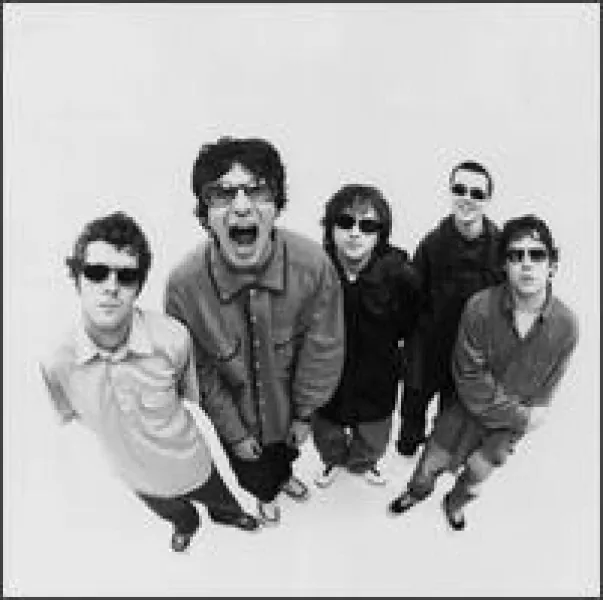
Super Furry Animals
Top Super Furry Animals albums
Top Super Furry Animals lyrics
(drawing) Rings Around The World
Super Furry Animals(Nid) Hon Yw'r Gân Sy'n Mynd I Achub Yr Iaith
Super Furry AnimalsAlternate Route To Vulcan Street
Super Furry AnimalsSuper Furry Animals biography
Super Furry Animals were one of the first post-alternative bands, fusing together a number of disparate musical genres -- including power pop, punk rock, techno, and progressive rock -- creating a shimmering, melodic, irreverent, and willfully artsy rock & roll. As one of the leading bands of the mid-'90s Welsh movement, they were already tagged as outsiders by their tendency to sing entire songs in their native tongue, but their very approach was unique, full of both whimsy and left-wing political activism. What set them apart from their fellow Welsh bands were their infectious melodic sensibilities and their wildly irreverent attitude, which peers like Gorky's Zygotic Mynci, 60 Foot Dolls, and Catatonia lacked. Super Furry Animals' 1996 debut album, Fuzzy Logic, became a major English hit, charting in the Top 40 and placing in the Top Ten of many year-end critic's polls.br /br /Formed in Cardiff, Wales, in 1993, Super Furry Animals was comprised of Gruff Rhys (lead vocals, guitar), Huw "Bunf" Bunford (guitar, vocals), Guto Pryce (ba**), Cian Ciaran (keyboards, electronics), and Dafydd Ieuan (drums). All five members had played in bands throughout their teens prior to forming the group, most notably Rhys, who had previously played in a jangle pop band named Emily which was briefly signed to Creation, as well as a Welsh noise rock band called Ffa Coffi Pawb. Following the dissolution of Ffa Coffi Pawb, Rhys played in a trio with Pryce and Ieuan, which eventually evolved into Super Furry Animals. Initially, the group was a techno outfit, yet they quickly evolved into a neo-psychedelic and progressive pop outfit. After two years or writing and touring, the band signed with the Cardiff-based independent label Ankst and released their debut EP, Lianfairpwllgywgyllgoger Chwymdrobwlltysiliogoygoyocynygofod (In Space), which was sung entirely in Welsh. It was followed within a few months by another EP, Moog Droog, which was also sung in Welsh. Both EPs were produced by Gorwel Owen.br /br /By the end of 1995, Super Furry Animals had gained a strong, cross-generational fan base in Wales while gathering a strong cult following in Britain, which led to a six-album record contract with Creation Records. Prior to signing with Creation, the band had decided to sing the majority of their songs in English, in order to reach a wider audience. Super Furry Animals and Owen produced the group's debut album, which was preceded by two singles in the spring of 1996 -- "Hometown Unicorn" and "God! Show Me Magic" -- which became moderate hits. Fuzzy Logic, the band's debut album, was released in the U.K. in June of 1996 to uniformly excellent reviews. Within a few months, SFA had become one of the hippest bands in British independent music, with several of the group's lyrical touchstones -- most notably the notorious Welsh dope smuggler Howard Marks, who appeared on the cover of Fuzzy Logic -- had become pop-culture refrences. Super Furry Animals also became infamous during the summer of 1996 for attending all of the pop music festivals in a gigantic tank. br /br /"Something 4 the Weekend" and "If You Don't Want Me to Destroy You" became hit singles in the summer and fall of 1996. The latter single was scheduled to have a B-side called "The Man Don't Give a f**," which was built on a sample of Steely Dan's "Showbiz Kids," but Donald Fagen refused to give the group permission to use the recording. By November, he relented and "The Man Don't Give a f**" was released as a limited-edition single in early December, and it reached number 22 on the U.K. charts. Super Furry Animals entered the studios in January of 1997 to record their second album, Radiator, which was released in August of 1997. Guerrilla followed two years later, and in mid-2000 the band resurfaced with MWNG. Cameos by John Cale and Paul McCartney were featured on the ambitious 2001 album Rings Around the World while 2003's Phantom Power was a looser affair. The compilation Songbook: The Singles, Vol. 1 and the new album Love Kraft were both released in 2005. ~ Stephen Thomas Erlewine, All Music Guide
